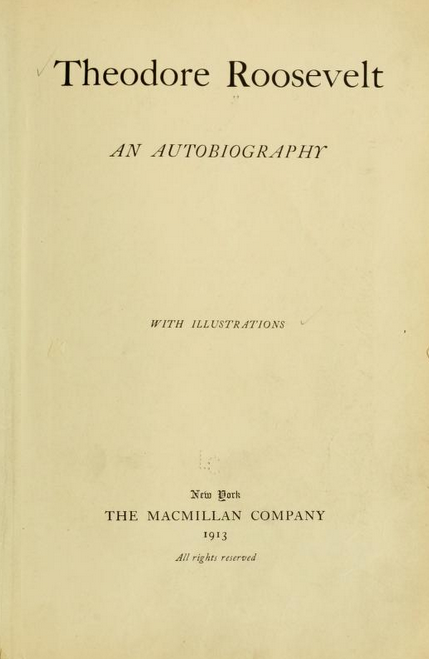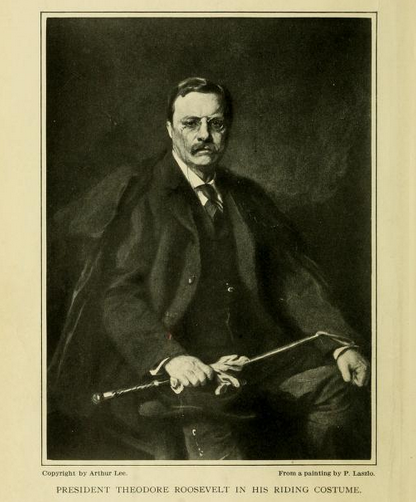If you’re a student, fan or aficionado of Roosevelt, you will want to read this book. Theodore Roosevelt: An Autobiography describes the kind of leadership America hasn’t seen for perhaps 60 years.
High Point: Much of the book is like having a private casual conversation with an ex-President.
Low Point: Roosevelt included an enormous amount of correspondence–full letters and often responses to responses to letters. The book is a great resource, but sometimes a bit more detail than necessary for a casual reader.
Author: Theodore Roosevelt
Publication Date: 1913
Genre: Biography
Project Gutenberg: Theodore Roosevelt: An Autobiography
LibriVox: Theodore Roosevelt: An Autobiography
Movie/TV Adaptation: None
Theodore Roosevelt: An Autobiography is a deep dive into the public life of America’s 26th president.
The casual reader may find the book to be a real slog. Roosevelt goes into detail about specific incidents from his political life. In many cases, he includes lengthy correspondence in its entirety. In a few instances, he posts complete chains of letters detailing the back and forth with those with whom he communicated.
But there are also long discussions concerning topics about which he was passionate—things like his favorite songbirds or a general discussion about books or his efforts to protect America’s natural resources. It’s almost as though you were having a private casual conversation with an ex-President.
Roosevelt gives his first-hand account as a lieutenant colonel in the US Army during the Spanish American War. That includes the famous battle at San Juan Hill for which he was awarded the Medal of Honor.
The bulk of his book concerns his activity in government service as a New York City Police Commissioner, the governor of New York, the Assistant Secretary of the Navy, the Vice President and finally as the President of the United States.
Roosevelt mentions little about his family. But if you’re interested, Edmund Morris’ three-volume biography is an excellent source for that. Better still, find Theodore Roosevelt’s Letters to His Children published in 1919 and edited by Roosevelt’s good friend Joseph Bucklin Bishop.
If you’re a student, fan or aficionado of Roosevelt, you will want to read this book. Theodore Roosevelt: An Autobiography describes the kind of leadership America hasn’t seen for perhaps 60 years.
Quotes
| One class of our citizens indulges in gushing promises to do everything for foreigners, another class offensively and improperly reviles them; and it is hard to say which class more thoroughly misrepresents the sober, self-respecting judgment of the American people as a whole. The only safe rule is to promise little, and faithfully to keep every promise; to “speak softly and carry a big stick.” |
| I think there ought to be children’s books. I think that the child will like grown-up books also, and I do not believe a child’s book is really good unless grown-ups get something out of it. |
| Each book was procured because some one of the family wished to read it. We could never afford to take overmuch thought for the outsides of books; we were too much interested in their insides. |
| But for unflagging interest and enjoyment, a household of children, if things go reasonably well, certainly makes all other forms of success and achievement lose their importance by comparison. |
| Personally I feel that it is exactly as much a “right” of women as of men to vote. But the important point with both men and women is to treat the exercise of suffrage as a duty, which, in the long run, must be well performed to be of the slightest value. |
| Americans learn only from catastrophes and not from experience. |
| I had always felt that if there were a serious war I wished to be in a position to explain to my children why I did take part in it, and not why I did not take part in it. Moreover, I had very deeply felt that it was our duty to free Cuba, and I had publicly expressed this feeling; and when a man takes such a position, he ought to be willing to make his words good by his deeds unless there is some very strong reason to the contrary. |
| Whenever we were in camp and so fixed that we could have regular meals, we used to have a general officers’ mess, over which I of course presided. During our entire service there was never a foul or indecent word uttered at the officers’ mess—I mean this literally; and there was very little swearing—although now and then in the fighting, if there was a moment when swearing seemed to be the best method of reaching the heart of the matter, it was resorted to. |
| The true preachers of peace, who strike earnestly to bring nearer the day when peace shall obtain among all peoples, and who really do help forward the cause, are men who never hesitate to choose righteous war when it is the only alternative to unrighteous peace. |
| The true preachers of peace, who strike earnestly to bring nearer the day when peace shall obtain among all peoples, and who really do help forward the cause, are men who never hesitate to choose righteous war when it is the only alternative to unrighteous peace. |
| The need for improvement in the Governmental methods of transacting business may be illustrated by an actual case. An officer in charge of an Indian agency made a requisition in the autumn for a stove costing seven dollars, certifying at the same time that it was needed to keep the infirmary warm during the winter, because the old stove was worn out. Thereupon the customary papers went through the customary routine, without unusual delay at any point. The transaction moved like a glacier with dignity to its appointed end, and the stove reached the infirmary in good order in time for the Indian agent to acknowledge its arrival in these words: “The stove is here. So is spring.” |
| The men who first applied the extreme Democratic theory in American life were, like Jefferson, ultra individualists, for at that time what was demanded by our people was the largest liberty for the individual. During the century that had elapsed since Jefferson became President the need had been exactly reversed. There had been in our country a riot of individualistic materialism, under which complete freedom for the individual—that ancient license which President Wilson a century after the term was excusable has called the “New” Freedom—turned out in practice to mean perfect freedom for the strong to wrong the weak. |
| Very much the most important action I took as regards labor had nothing to do with legislation, and represented executive action which was not required by the Constitution. It illustrated as well as anything that I did the theory which I have called the Jackson-Lincoln theory of the Presidency; that is, that occasionally great national crises arise which call for immediate and vigorous executive action, and that in such cases it is the duty of the President to act upon the theory that he is the steward of the people, and that the proper attitude for him to take is that he is bound to assume that he has the legal right to do whatever the needs of the people demand, unless the Constitution or the laws explicitly forbid him to do it. |


